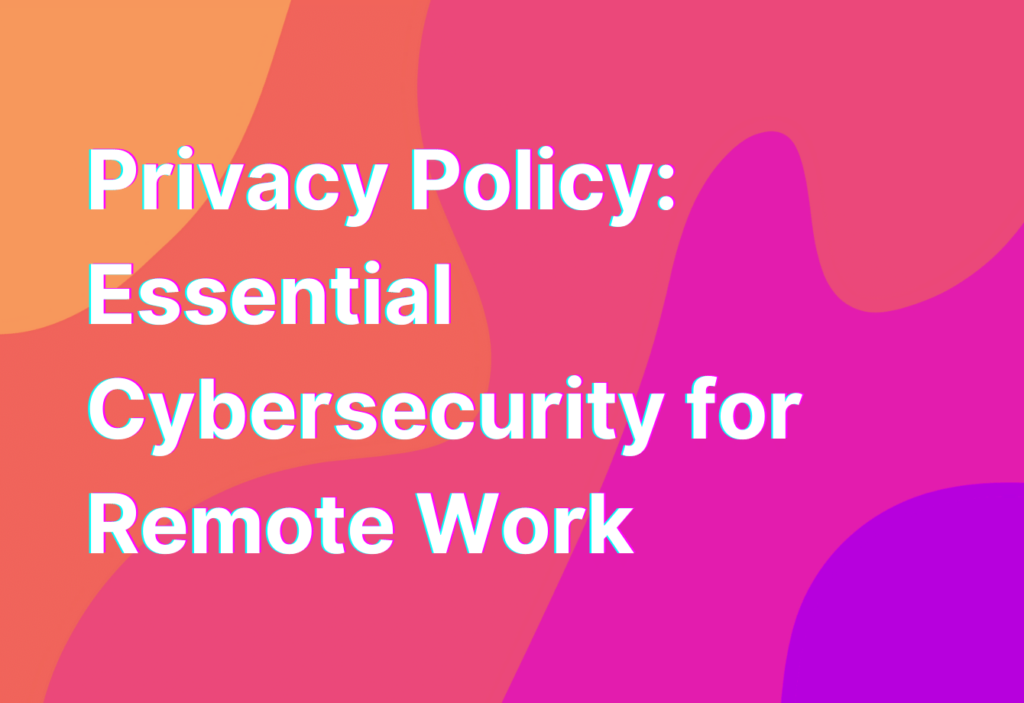Privacy Policy: Essential Cybersecurity for Remote Work
Hey there, remote workers! It’s Ashley, your friendly remote work advocate, here to talk about an important topic: privacy policy. When it comes to remote work, ensuring the privacy and security of your personal and professional information is crucial. In this article, we’ll dive into the essentials of cybersecurity for remote work and why having a solid privacy policy is a must. So grab your favorite cup of coffee and let’s get started!
Why is a Privacy Policy Important?
Before we delve into the specifics, let’s take a moment to understand why having a privacy policy is so important for remote workers. In a world where cyber threats are becoming increasingly sophisticated, protecting your personal and professional information is essential. A privacy policy outlines how your data is collected, used, and protected, giving you peace of mind and ensuring that your information is in safe hands.
Now, let’s explore some key elements that should be included in your privacy policy:
1. Data Collection and Usage
First and foremost, your privacy policy should clearly state what data is collected from remote workers and how it is used. This includes information such as your name, email address, and any other personal or professional details that may be required for remote work purposes. It’s important to be transparent about how this data is used and ensure that it is only used for legitimate business purposes.
2. Data Security Measures
When it comes to remote work, data security is of utmost importance. Your privacy policy should outline the security measures in place to protect your data from unauthorized access, loss, or theft. This may include encryption, firewalls, secure servers, and regular data backups. By clearly stating these security measures, you can assure remote workers that their information is being handled with the utmost care.
3. Third-Party Sharing
In some cases, remote work may require sharing data with third-party service providers. Your privacy policy should clearly state if and when data will be shared with third parties, and provide details on how these parties handle and protect the data. It’s important to choose reputable service providers and ensure that they have their own privacy policies in place.
4. Cookies and Tracking
Many websites use cookies and tracking technologies to collect data about their visitors. If your remote work website uses cookies or tracking, it’s important to disclose this in your privacy policy. Be transparent about what data is collected, how it is used, and how users can opt out of tracking if they wish.
5. Compliance with Laws and Regulations
Lastly, your privacy policy should state that you comply with all applicable laws and regulations regarding data protection and privacy. This includes laws such as the General Data Protection Regulation (GDPR) in the European Union and the California Consumer Privacy Act (CCPA) in the United States. By clearly stating your commitment to compliance, you build trust with remote workers and demonstrate your dedication to protecting their privacy.
Wrapping Up
And there you have it, remote workers! A privacy policy is an essential component of cybersecurity for remote work. By clearly outlining how data is collected, used, and protected, you can ensure the privacy and security of your personal and professional information. So take the time to create a solid privacy policy and give yourself and your remote team the peace of mind they deserve.
Remember, cybersecurity is an ongoing process, so stay informed about the latest trends and best practices. If you want to learn more about ransomware-as-a-service and how it can impact remote work, check out this link. Stay safe and happy remote working!


